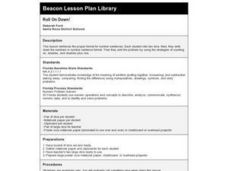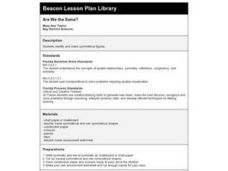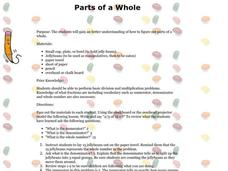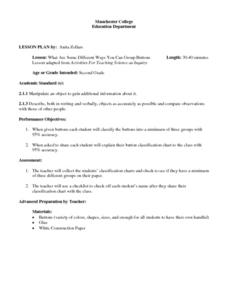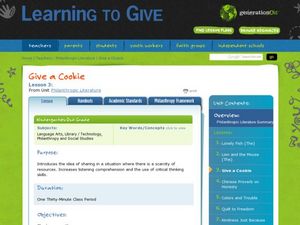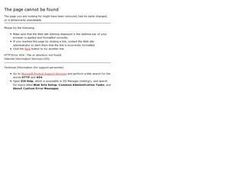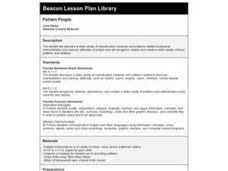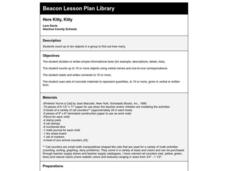Curated OER
Estimation
Students estimate quantity, length, and area. Students practice making comparison estimations of different items and estimate whether or not the amount is greater or less than a certain amount. Students practice making estimations.
Curated OER
Length, Perimeter, and Area
Students explore the concepts of length, perimeter and area. Students develop an understanding of length, perimeter, and area. Students calculate the area and perimeter of random shapes and calculate the area and perimeter of a triangle...
Curated OER
Roll On Down!
Students create number sentences by rolling two dice. Each student rolls the dice and writes down the numbers in number sentence format. Then they add the problem by using the strategies of counting on and doubles.
Curated OER
Measuring Mania
Second graders turn into measuring maniacs with this activity! With real world objects, 2nd graders practice measuring accurately to the nearest inch and centimeter. After a lecture/demo, students practice with a worksheet imbedded in...
Curated OER
Are We the Same?
Students define and discuss symmetry, line of symmetry, and congruency. They cut shapes out of construction paper, identify the line of symmetry, and if they are symmetrical and/or congruent.
Curated OER
Who Wants Pizza?
Young scholars practice fraction skills online at the "Want Some Pizza" website. They complete activities via the internet and on square grid paper. They pull down tabs to check their answers.
Curated OER
What Would You Do With $5.00?
Students watch the video Alexander Who Used to Be Rich Last Sunday.
Curated OER
What is zero? What is infinity? Where they come from? (Senior, Mathematics)
Students discuss and determine what is zero, what is infinity, and where do these numbers come from?
Curated OER
Parts of a Whole
Students gain an better understanding of how to figure out parts of a whole.
Curated OER
Ants
Young scholars make sequential patterns by using ants and following the model. They identify different parts of an ant by matching the picture to the word name. Pupils identify the ant's life cycle by creating a chart using pictures.
Curated OER
One Good Turn Deserves Another
Young scholars make observations about shapes and 1-, 2-, and 3-dimensional objects. They conduct observations and make predictions regarding transformations of simple geometric shapes. They identify shapes that occur in household items.
Curated OER
Geoboard Squares
Students create squares of different sizes on a geoboard. They find and describe a pattern. Students use the pattern to determine the number of squares possible on a 10-by-10 geoboard. They create squares with a horizontal base (and...
Curated OER
What Are Some Different Ways You Can Group Buttons
Second graders classify and group buttons. They discuss how their buttons are alike and different, and identify the characteristics of their handful of buttons. Students then classify their buttons into three groups, and create a...
Curated OER
Give a Cookie
Students discover the importance of sharing. In this philanthropy lesson plan, students read the book The Doorbell Rang and discuss how the character practiced sharing in the story. Students make cookies and practice the philanthropic...
Curated OER
Philanthropic Literature: Give a cookie
Young scholars read a book to discover the importance of sharing. They predict what will happen in the story. Students use manipulatives to model the story problem. Young scholars follow instructions, measure ingredients, and make...
Curated OER
It's a 3-D World Out There!
Students construct polygons. They identify attributes of three-dimensional shapes. Students name common three-dimensional shapes. They draw three-dimensional shapes, and sort three-dimensional shapes. Students use K'NEX materials sets to...
Curated OER
Dividing into Two Parts — Halves
In this fractions worksheet, students divide pictures into halves to introduce them to fractions. Students complete 3 sets of problems.
Curated OER
Graphing Our Favorite Candy Bars
Students use ClarisWorks to graph class' favorite candy bars on a bar graph.
Curated OER
Measurement Mania
Second graders observe and demonstrate how to measure different objects. They listen to the book "Corduroy," and measure different aspects of a teddy bear, discuss how to measure using a variety of units of measurement, and complete a...
Curated OER
Probability or Ability?
Students toss candy and coins using their non-dominant hand while their partners records the results on a probability charts.
Curated OER
Grade 2: Texas Problem Solving
Second graders use numerical data about Texas to write and solve real-life problems involving addition and subtraction (or multiplication and division). They work in pairs to choose three numerical facts about Texas to use to make up...
Curated OER
Pattern People
Students describe a wide variety of classification schemes and patterns related to physical characteristics and sensory attributes of people. They recognize, extend and create a wide variety of those patterns and relations.
Curated OER
Fraction Card Shark
Second graders explain the relative size of fractions using symbolic and concrete representations. Groups of four students play a game which uses cards and unifix cubes. The game helps them get a visual understanding for the 'size' of...




